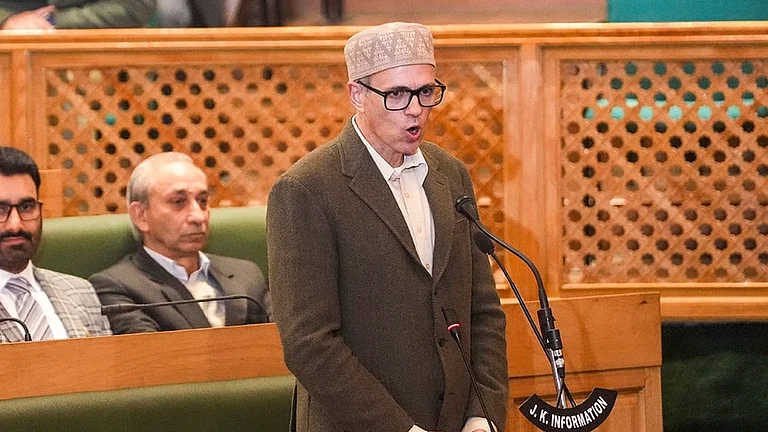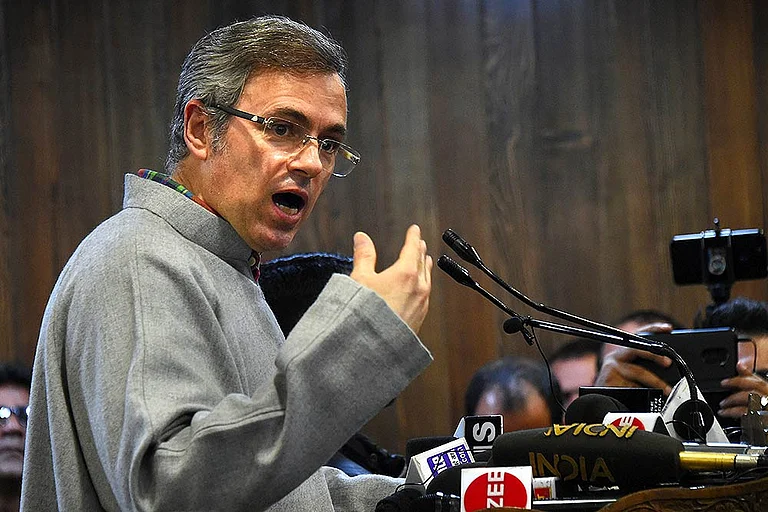Jammu & Kashmir welcomed the newly elected government with Omar Abdullah taking the oath of office as the Chief Minister on Wednesday. Leaders, including Congress president Mallikarjun Kharge and MP Rahul Gandhi, were present at the Sher-i-Kashmir International Conference Centre (SKICC) in Srinagar where JKNC Vice President Omar Abdullah took oath as the Chief Minister of Jammu and Kashmir.
The day holds great importance heralding the establishment of an elected government for the first time since June 2018.
Five ministers -- Sakina Masood (Itoo), Javed Dar, Javed Rana, Surinder Choudhary, and Satish Sharma -- also took the oath of office.
Jammu & Kashmir New Government |Key Highlights
Omar Abdullah takes oath as CM
Omar Abdullah, the vice president of the National Conference (NC), took oath as the Chief Minister of Jammu and Kashmir a day after receiving a formal invitation from Lieutenant Governor Manoj Sinha to lead the next government following the revocation of the President's rule, which had been in effect for nearly six years.
As Abdullah takes the helm for his second term, having previously served from 2009 to 2014, the challenge of navigating a complex political landscape while addressing the pressing needs of the people of Jammu & Kashmir stands before him. His government is expected to prioritise the restoration of statehood and the revival of democratic processes in the region.
With a mandate from the electorate and the support of a robust coalition, Abdullah's leadership will be closely watched as Jammu & Kashmir embarks on a new chapter in its political history.
J&K Election Results
Counting for Jammu and Kashmir Assembly elections 2024 took place on October 8, paving the way for the first elected government in the union territory.
The Congress-National Conference (NC) took a comfortable lead in J&K after several rounds of counting, emerging victory in the elections, which have taken place in the Union Territory for the first time since the abrogation of Article 370 of the Indian Constitution.
The elections to 90 seats of the Jammu and Kashmir assembly took place in three phases - September 18, September 25, and October 1.
The National Conference-Congress alliance emerged victorious in Jammu and Kashmir by bagging 48 seats, while the BJP secured 29 seats in the 90-member state Assembly.
'Centre Will Work Closely': PM Modi
Prime Minister Narendra Modi on Wednesday congratulated Omar Abdullah on being sworn in as the chief minister of Jammu and Kashmir, and said the Centre will work closely with him and his team for J-K's progress.
In a post on X, Modi said, "Congratulations to Shri Omar Abdullah Ji on taking oath as the Chief Minister of Jammu and Kashmir. Wishing him the very best in his efforts to serve the people."
"The Centre will work closely with him and his team for J&K's progress," the prime minister said.
Cabinet constraints and coalition dynamics
During a meeting with Lieutenant Governor Sinha, Abdullah staked his claim to form a government, presenting letters of support from coalition partners, including Independents and the Aam Aadmi Party. This solidified the NC-Congress alliance, which enjoys a comfortable majority in the assembly.
However, the new Chief Minister will face the challenge of forming a compact cabinet, limited to just nine members under the Jammu and Kashmir Reorganisation Act, which mandates that the council of ministers be 10 per cent of the legislative assembly. This means Abdullah's cabinet will comprise just nine members, necessitating careful selection to ensure representation from both Kashmir and Jammu.
The Congress is expected to secure one or two cabinet positions, with former minister Peerzada Muhammad Sayeed being a strong contender.
Political transition after years of uncertainty
The transition to an elected government follows a prolonged period of Governor's rule, which began after the then-Chief Minister Mehbooba Mufti resigned in June 2017, and later the President’s rule from 2019.
The President's rule, which has been in effect since the abrogation of Article 370 in August 2019, has led to turbulent political dynamics, including the dissolution of the previous coalition government between the People’s Democratic Party and the Bharatiya Janata Party in June 2018.
The abrogation of Article 370 scrapped the statehood of Jammu & Kashmir and led to the region being reorganized into two Union Territories: Jammu & Kashmir and Ladakh.
With the recent assembly elections, where the National Conference won 42 out of 90 contested seats, the path was cleared for the formation of a new government. The NC's alliance with the Indian National Congress, which secured six seats, brings their total to 48 seats in the 95-member assembly.
Who attended the swearing-in ceremony
Leader of Opposition in Lok Sabha Rahul Gandhi, Congress president Mallikarjun Kharge and party general secretary Priyanka Gandhi attended the oath-taking ceremony of CM-elect Omar Abdullah in Srinagar on Wednesday.
Leaders from the INDIA bloc, including figures like Akhilesh Yadav from the Samajwadi Party and Kanimozhi Karunanidhi from the DMK also attended the swearing-in ceremony, reflecting a broader political unity among opposition parties.
MY Tarigami of the CPI(M) expressed optimism regarding the incoming government and said, “The time has come to revive the democratic process in J&K,” while acknowledging the challenges that lie ahead.


























